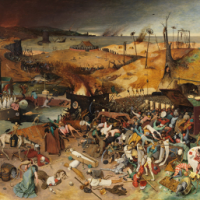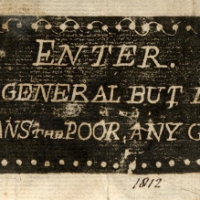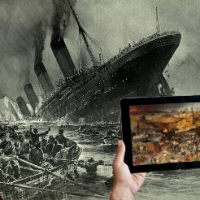All our grievances do, in fact, remain connected
[hi, long-lost other writer here, apologies for the long absence]
Two things got libraryland heated last week, and at first glance they have little to do with each other.
First up, the poorly conceived letter to NARA from the American Historical Association that dropped on August 2. Three days later they issued a contrite second letter after archivists and librarians deservedly chewed their dang heads off. You can read both letters here.
The first letter “express[ed] concerns regarding the National Archives and Records Administration’s planned research room capacity across its facilities, including presidential libraries, as the agency begins to reopen following pandemic closures.” It reads a bit like an erudite academic version of the early pandemic whinging about not being able to get haircuts. And even if one were to be more forgiving than that and recognize that historical knowledge and the research that is necessary to some careers are a bit more important than getting one’s roots touched up, it shows that the AHA is utterly out of touch with the archival field and its discourse. Which is a bit shameful, since they depend on archives for their own work, as this letter itself proves.
If the AHA was aware of the ongoing discourse in archives (and libraries and museums), it would know that labor is a touchy subject, and that demands we further extend ourselves would go over like a lead balloon. They’d know we are all overworked and underpaid. That we’re drowning in student debt. That our labor is increasingly contingent. That nearly every archives, library, and museum is understaffed, and that we’ve been doing more with less for so long that at this point we can only do less with less. And that the COVID-19 pandemic, WHICH IS NOT OVER AND IS ACTUALLY GETTING WORSE AGAIN VERY QUICKLY, has and continues to stretch us all to the breaking point and beyond, and shown us that both our employers and our patrons largely do not give a damn about us as human beings. All pandemic long, some archivists and librarians have been forced to work in dangerous conditions that increased the chance of virus transmission, rather than having to tell a single ungrateful patron that, no, they can’t come in a browse the stacks/have that book or DVD immediately/use the meeting rooms/whatever.
There is no such thing as a bibliographic emergency, but no one seems to have told directors or boards that we aren’t doing brain surgery in the stacks. Even now, archivists and librarians who have successfully worked from home for nearly a year and a half are being told they must go back to the office. The lucky ones work places that mandate vaccines for staff or masks for patrons. But with the pandemic picking up speed again due to the more-transmissible delta variant, low vaccination rates, and masking regulations having been dropped nearly everywhere, archivists and librarians are right to be concerned that their workplaces still are not safe. The librarians at NYPL, for example, are trying to shine light on what seems like a pattern of institutional disregard for their health and safety. Speaking for myself, I’m beginning to feel the same way as my institution has had us all back in the office for a week, while over the last month cases in this state have risen from 100/day to 1,000/day — and as of this writing, vaccines are not mandatory for staff, masks are optional for both staff & patrons who are vaccinated (but we can’t ask if someone’s been vaccinated!), and formerly mandatory weekly testing of staff has ended. With 20,000 undergrads showing up in a few weeks, my workplace seems ripe for undetected virus spread.
And against that backdrop, the AHA told NARA and archivists everywhere that they don’t give a shit. That the health and safety of people who work in archives is unimportant to them, and certainly less important than having business as usual access to archives’ documents. Because that — archives worker’s safety for access to documents — is the unavoidable tradeoff right now. It just is. The invisibility of archivists’ labor has been an issue (again, one that AHA seemed to be either unaware or uncaring of) for a long time. Every time a breathless “researcher discovers lost document in archives!!” article is written, we all groan. It was not lost. It was obviously right there, in the archives, and likely mentioned in the finding aid. Which was written by an archivist. Who is clearly being ignored.
There’s a lot to be said, of course, about how hard archivists and librarians have worked to make it look easy, to make access to the resources we steward be as convenient and seamless as possible. I don’t think that’s an excuse, though. Any researcher who has been to a reading room (as the AHA letter writers obviously have, since that’s what they are expressing concern about) has interacted with the people who work in archives. You can’t avoid it! Archival access is highly mediated by archives staff, from the moment you walk in the door to the moment you walk out. If researchers somehow manage to forget that or to compartmentalize the archives staff they interact with away from the rest of their experience in the reading room — there’s a point at which that’s on them, not us.
If historians and other researchers have a hard time remembering that actual humans work in archives and enable their research, that’s on them. If they value their research over the health and safety of the people who work in archives — are willing to suggest, as the AHA did in their first letter, that archives workers risk possible death in order to enable and expedite historical research — that’s on them.
To be sure, it’s not *only* them. We’ve seen throughout the pandemic that anyone who works in a service profession has been rendered basically a non-person, undeserving of safety. Make no mistake, the pink-collar ghettos of education, libraries and archives, nursing, and so on are service professions, though they are given higher status and (sometimes, only sometimes) higher pay than stocking grocery shelves or delivering takeout. Like the AHA, consumers have largely navigated the pandemic without thought for the well-being of the humans on the other end of their transactions; nor did this relationship begin with the pandemic. And along with the gendered nature of the issue in libraries and archives and other helping and service professions, which is certainly part of how we ended up here, the abuse and exploitation of workers by consumers has fallen along every line of power and hegemony, be it race, immigration status, class and wealth, education level, etc.
The second rage-inducing thing last week was the belated news of the death of a librarian who worked at Temple University, Latanya Jenkins. No, she didn’t die of COVID. She died of cancer in April, but reports from friends and coworkers tell us that the conditions under which Temple forced her to work killed her as surely as working conditions killed every line cook who caught COVID while prepping the takeout we’ve all been eating.
In particular, the sick leave policy at Temple, and its enforcement by supervisors and management, killed her. While staff like Jenkins get ten sick days a year, which roll over year to year, progressive discipline kicks in after more than six are taken in a year, under the guise of “excessive sick days.” That an employee could be disciplined at all for taking sick time they have been given is perverse and abusive; that discipline kicks in at merely six days in a year is incredibly cruel; and that it is termed “progressive discipline,” which is a labor right that is supposed to protect workers from capricious management, makes me want to burn it all down. If you work for Temple University, you quite literally get in trouble for daring to be sick! Six days is getting the flu or food poisoning in February and then having a horrible migraine in August. You’d better not fall off your bike in October, too, or you’ll face disciplinary actions at work. It basically guarantees that no one managing a disability or chronic illness, or who has a single major illness or accident can work at Temple, unless they just want to be in trouble all the time. I honestly do not know how Temple has gotten away with this for so long.
So, Jenkins was “run into the ground” while trying to not die of cancer. Clearly Temple and the ground won. A bad person from HR is quoted in the Philadelphia Enquirer article about the reasons for the inhumane policy:
“We have 6,500 employees,” said Sharon Boyle, Temple’s vice president of human resources. “We don’t have a lot of fat at Temple, we’re state-funded, we try to keep our costs low because access is important to us.”
Imagine being enough of a ghoul to say that, especially loading the burden of affordable higher education onto the backs of employees with illnesses like cancer by saying that “access is important.” It’s also just patently false. Your faithful librarian works at a state university elsewhere in the country, and I get fifteen sick days a year. We have no discipline-related policy connected to our sick time (BECAUSE OF COURSE WE DON’T), and are generally encouraged to take time off for our health when we need it. It’s not rocket surgery.
Reading in between the lines of the Inquirer article, I notice two things that tie us back to the AHA’s letter. First is the faculty union, of which librarians are part, recognizes that the sick time policy “treats us like children.” The second is that the ghoul from HR says that supervisors have a lot of leniency in enforcing or not enforcing the discipline policy and that they rarely do so. I can only wonder why, since Jenkins is described by colleagues as being a hardworking and devoted librarian and with terminal cancer was clearly not faking illness, she was facing discipline and why her supervisor felt it necessary to call her daily to check whether she was in the hospital. I wonder if (let’s be honest, the real question is how much, not if) the fact of her Blackness and the institutional and individual racism of Temple and library management enforced the sick leave discipline policy when they apparently had the leeway to not do so.
Here’s the commonality: library workers are expendable and we are not trusted. We serve and serve and serve, and when we burn out or just up and die, that’s acceptable and there’s always more cannon fodder to replace us — or maybe the positional will be cut and our overburdened coworkers will have to pick up the slack, because they are expendable, too. Despite what should be seen as a miraculous collective track record of service, we are not trusted to do our work without close oversight from administration, whether the question is remote work or sick time. The fact of being largely a female profession double all these things down, even as they are the general neoliberal worklife condition, and Blackness, queerness, disability and other intersections multiply it more for some of us. Even those closest to us professionally, historians, value their research more than our lives. We are not considered the experts on our own profession, not trusted or allowed autonomy over our work, a resource to be burnt to fuel PR campaigns and university rankings.
Whether you are a NARA archivist being told that the historians are displeased with your safety measures, a public librarian at an understaffed branch during a COVID spike, or a university librarian LITERALLY DYING because of HR policies, your grievances are connected. In each case your life and humanity is less important than someone else’s bottom line, because the logic of capitalism has become — or maybe always was — foundational to even our most commonly held institutions, including libraries and archives.








!["The Tree of Science" an English translation of Eugene Huzar's "L'arbre de la science" [Part 3]](https://librarianshipwreck.files.wordpress.com/2020/10/gustav-dore_the-new-zealander.jpg?w=200&h=200&crop=1)


